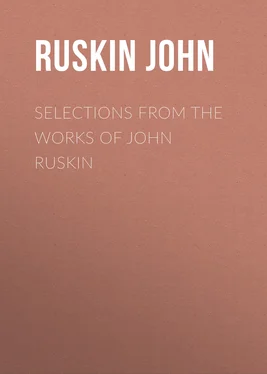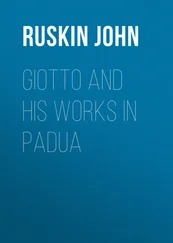John Ruskin - Selections From the Works of John Ruskin
Здесь есть возможность читать онлайн «John Ruskin - Selections From the Works of John Ruskin» — ознакомительный отрывок электронной книги совершенно бесплатно, а после прочтения отрывка купить полную версию. В некоторых случаях можно слушать аудио, скачать через торрент в формате fb2 и присутствует краткое содержание. Жанр: foreign_antique, foreign_home, literature_19, visual_arts, на английском языке. Описание произведения, (предисловие) а так же отзывы посетителей доступны на портале библиотеки ЛибКат.
- Название:Selections From the Works of John Ruskin
- Автор:
- Жанр:
- Год:неизвестен
- ISBN:нет данных
- Рейтинг книги:4 / 5. Голосов: 1
-
Избранное:Добавить в избранное
- Отзывы:
-
Ваша оценка:
- 80
- 1
- 2
- 3
- 4
- 5
Selections From the Works of John Ruskin: краткое содержание, описание и аннотация
Предлагаем к чтению аннотацию, описание, краткое содержание или предисловие (зависит от того, что написал сам автор книги «Selections From the Works of John Ruskin»). Если вы не нашли необходимую информацию о книге — напишите в комментариях, мы постараемся отыскать её.
Selections From the Works of John Ruskin — читать онлайн ознакомительный отрывок
Ниже представлен текст книги, разбитый по страницам. Система сохранения места последней прочитанной страницы, позволяет с удобством читать онлайн бесплатно книгу «Selections From the Works of John Ruskin», без необходимости каждый раз заново искать на чём Вы остановились. Поставьте закладку, и сможете в любой момент перейти на страницу, на которой закончили чтение.
Интервал:
Закладка:
And thus, although there are few districts of Northern Europe, however apparently dull or tame, in which I cannot find pleasure, though the whole of Northern France (except Champagne), dull as it seems to most travellers, is to me a perpetual Paradise; and, putting Lincolnshire, Leicestershire, and one or two such other perfectly flat districts aside, there is not an English county which I should not find entertainment in exploring the cross-roads of, foot by foot; yet all my best enjoyment would be owing to the imagination of the hills, colouring, with their far-away memories, every lowland stone and herb. The pleasant French coteau, green in the sunshine, delights me, either by what real mountain character it has in itself (for in extent and succession of promontory the flanks of the French valleys have quite the sublimity of true mountain distances), or by its broken ground and rugged steps among the vines, and rise of the leafage above, against the blue sky, as it might rise at Vevay or Como. There is not a wave of the Seine but is associated in my mind with the first rise of the sandstones and forest pines of Fontaine-bleau; and with the hope of the Alps, as one leaves Paris with the horses' heads to the south-west, the morning sun flashing on the bright waves at Charenton. If there be no hope or association of this kind, and if I cannot deceive myself into fancying that perhaps at the next rise of the road there may be seen the film of a blue hill in the gleam of sky at the horizon, the landscape, however beautiful, produces in me even a kind of sickness and pain; and the whole view from Richmond Hill or Windsor Terrace,—nay, the gardens of Alcinous, with their perpetual summer,—or of the Hesperides (if they were flat, and not close to Atlas), golden apples and all,—I would give away in an instant, for one mossy granite stone a foot broad, and two leaves of lady-fern. 25 25 In tracing the whole of the deep enjoyment to mountain association, I of course except whatever feelings are connected with the observance of rural life, or with that of architecture. None of these feelings arise out of the landscape properly so called: the pleasure with which we see a peasant's garden fairly kept, or a ploughman doing his work well, or a group of children playing at a cottage door, being wholly separate from that which we find in the fields or commons around them; and the beauty of architecture, or the associations connected with it, in like manner often ennobling the most tame scenery;—yet not so but that we may always distinguish between the abstract character of the unassisted landscape, and the charm which it derives from the architecture. Much of the majesty of French landscape consists in its grand and grey village churches and turreted farmhouses, not to speak of its cathedrals, castles, and beautifully placed cities. [Ruskin.]
I know that this is in great part idiosyncrasy; and that I must not trust to my own feelings, in this respect, as representative of the modern landscape instinct: yet I know it is not idiosyncrasy, in so far as there may be proved to be indeed an increase of the absolute beauty of all scenery in exact proportion to its mountainous character, providing that character be healthily mountainous. I do not mean to take the Col de Bonhomme as representative of hills, any more than I would take Romney Marsh as representative of plains; but putting Leicestershire or Staffordshire fairly beside Westmoreland, and Lombardy or Champagne fairly beside the Pays de Vaud or the Canton Berne, I find the increase in the calculable sum of elements of beauty to be steadily in proportion to the increase of mountainous character; and that the best image which the world can give of Paradise is in the slope of the meadows, orchards, and corn-fields on the sides of a great Alp, with its purple rocks and eternal snows above; this excellence not being in any wise a matter referable to feeling, or individual preferences, but demonstrable by calm enumeration of the number of lovely colours on the rocks, the varied grouping of the trees, and quantity of noble incidents in stream, crag, or cloud, presented to the eye at any given moment.
For consider, first, the difference produced in the whole tone of landscape colour by the introductions of purple, violet, and deep ultramarine blue, which we owe to mountains. In an ordinary lowland landscape we have the blue of the sky; the green of grass, which I will suppose (and this is an unnecessary concession to the lowlands) entirely fresh and bright; the green of trees; and certain elements of purple, far more rich and beautiful than we generally should think, in their bark and shadows (bare hedges and thickets, or tops of trees, in subdued afternoon sunshine, are nearly perfect purple, and of an exquisite tone), as well as in ploughed fields, and dark ground in general. But among mountains, in addition to all this, large unbroken spaces of pure violet and purple are introduced in their distances; and even near, by films of cloud passing over the darkness of ravines or forests, blues are produced of the most subtle tenderness; these azures and purples 26 26 One of the principal reasons for the false supposition that Switzerland is not picturesque, is the error of most sketchers and painters in representing pine forest in middle distance as dark green, or grey green, whereas its true colour is always purple, at distances of even two or three miles. Let any traveller coming down the Montanvert look for an aperture, three or four inches wide, between the near pine branches, through which, standing eight or ten feet from it, he can see the opposite forests on the Breven or Flegère. Those forests are not above two or two and a half miles from him; but he will find the aperture is filled by a tint of nearly pure azure or purple, not by green. [Ruskin.]
passing into rose-colour of otherwise wholly unattainable delicacy among the upper summits, the blue of the sky being at the same time purer and deeper than in the plains. Nay, in some sense, a person who has never seen the rose-colour of the rays of dawn crossing a blue mountain twelve or fifteen miles away, can hardly be said to know what tenderness in colour means at all; bright tenderness he may, indeed, see in the sky or in a flower, but this grave tenderness of the far-away hill-purples he cannot conceive.
Together with this great source of pre-eminence in mass of colour, we have to estimate the influence of the finished inlaying and enamel-work of the colour-jewellery on every stone; and that of the continual variety in species of flower; most of the mountain flowers being, besides, separately lovelier than the lowland ones. The wood hyacinth and wild rose are, indeed, the only supreme flowers that the lowlands can generally show; and the wild rose is also a mountaineer, and more fragrant in the hills, while the wood hyacinth, or grape hyacinth, at its best cannot match even the dark bell-gentian, leaving the light-blue star-gentian in its uncontested queenliness, and the Alpine rose and Highland heather wholly without similitude. The violet, lily of the valley, crocus, and wood anemone are, I suppose, claimable partly by the plains as well as the hills; but the large orange lily and narcissus I have never seen but on hill pastures, and the exquisite oxalisis pre-eminently a mountaineer. 27 27 The Savoyard's name for its flower, "Pain du Bon Dieu," is very beautiful; from, I believe, the supposed resemblance of its white and scattered blossom to the fallen manna, [Ruskin.]
To this supremacy in mosses and flowers we have next to add an inestimable gain in the continual presence and power of water. Neither in its clearness, its colour, its fantasy of motion, its calmness of space, depth, and reflection, or its wrath, can water be conceived by a lowlander, out of sight of sea. A sea wave is far grander than any torrent—but of the sea and its influences we are not now speaking; and the sea itself, though it can be clear, is never calm, among our shores, in the sense that a mountain lake can be calm. The sea seems only to pause; the mountain lake to sleep, and to dream. Out of sight of the ocean a lowlander cannot be considered ever to have seen water at all. The mantling of the pools in the rock shadows, with the golden flakes of light sinking down through them like falling leaves, the ringing of the thin currents among the shallows, the flash and the cloud of the cascade, the earthquake and foam-fire of the cataract, the long lines of alternate mirror and mist that lull the imagery of the hills reversed in the blue of morning,—all these things belong to those hills as their undivided inheritance.
Читать дальшеИнтервал:
Закладка:
Похожие книги на «Selections From the Works of John Ruskin»
Представляем Вашему вниманию похожие книги на «Selections From the Works of John Ruskin» списком для выбора. Мы отобрали схожую по названию и смыслу литературу в надежде предоставить читателям больше вариантов отыскать новые, интересные, ещё непрочитанные произведения.
Обсуждение, отзывы о книге «Selections From the Works of John Ruskin» и просто собственные мнения читателей. Оставьте ваши комментарии, напишите, что Вы думаете о произведении, его смысле или главных героях. Укажите что конкретно понравилось, а что нет, и почему Вы так считаете.












